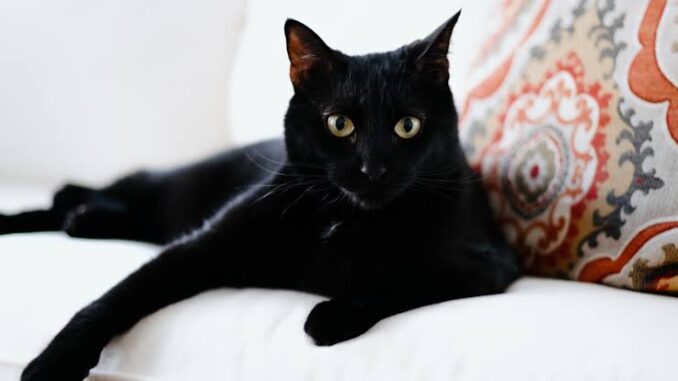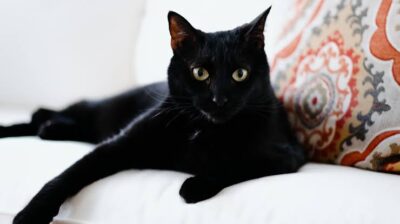
Facts about Black Cats: Black cats have been a source of intrigue and mystique for centuries. With their sleek, midnight-colored fur and penetrating eyes, they evoke a sense of mystery and allure. However, beyond the superstitions and myths that have surrounded them, black cats have qualities that make them truly fascinating.

In this article, we’ll explore 10 little-known facts about black cats, shedding light on their unique characteristics, history, and the roles they play in our lives.
10 Fascinating Facts About Black Cats You Probably Didn’t Know
1. Black Cats Are Not a Breed, But a Color
One common misconception is that black cats belong to a specific breed, but the reality is far different. Black cats can belong to any cat breed, as long as they inherit the gene for black fur. The black color results from a dominant gene known as B, which produces the eumelanin pigment that gives their fur its dark shade.
While there are specific breeds where black cats are common, such as the Bombay and the Maine Coon, black cats can be found in a variety of breeds, from Persians to domestic shorthairs. So, the next time you spot a black cat, remember that they could come from a wide range of feline family trees!
2. They Have a Long History of Superstition
Throughout history, black cats have been linked to superstitions and myths. In some cultures, they are seen as omens of good luck, while in others, they have been feared and associated with witchcraft. In medieval Europe, black cats were believed to be witches’ familiars or even witches in disguise.
This led to the widespread persecution of black cats during the witch hunts. On the other hand, in ancient Egypt, cats, including black ones, were revered and worshipped. They were believed to bring protection and were often associated with the goddess Bastet, who represented home, fertility, and childbirth.
In parts of Britain and Ireland, black cats are still considered symbols of good luck, especially when they cross your path. In contrast, other cultures view them as bad omens. Despite these mixed beliefs, black cats have remained a constant in folklore and superstition across centuries.
3. Black Cats Can Be More Affectionate Than You Think
Black cats are often stereotyped as aloof or independent, but in reality, they can be some of the most affectionate and loving companions. Many black cats are known to form strong bonds with their owners and can be very sociable. In fact, studies have shown that black cats tend to have calmer temperaments than other cats, which may make them better suited to family environments. While each cat is unique, it’s safe to say that black cats are just as capable of providing unconditional love and affection as cats of other colors. They might even be more cuddly, enjoying snuggles and purring contently in their owners’ laps.
4. The Genetic Mutation Behind Their Black Fur
As mentioned, the color of a black cat’s fur is determined by a dominant gene. This gene produces eumelanin, the pigment responsible for their deep black coat. However, the genetic mutation that causes black fur goes beyond aesthetics.
In some cases, this gene can also make black cats more resilient to certain diseases. For example, some studies suggest that black cats may have a lower susceptibility to feline immunodeficiency virus (FIV) compared to cats of other colors. Additionally, the darker pigment may help protect against sunburn, making black cats potentially better suited for outdoor life in sunny climates.
Interestingly, black cats are not always entirely black. In certain lighting conditions, especially in sunlight, you might notice that their fur reveals an undercoat of deep brown, giving them a slightly different shade of black. This effect is known as “auburning” and is particularly noticeable in certain breeds like the Bombay.
5. They Are Highly Intelligent and Curious
Black cats are known for their intelligence and curiosity, traits shared by many felines. They are quick learners and can be trained to perform tricks or follow commands with patience and consistency. Some black cats are also adept at problem-solving, often finding creative ways to get food or access places that are otherwise off-limits.
Their inquisitive nature often leads them to explore their surroundings, sometimes getting into mischief as they discover new nooks and crannies of the home.
Their intelligence is one of the reasons black cats are so adaptable to different environments. They thrive in households with active families, enjoying the mental stimulation that comes with exploration and interaction. While some may consider black cats mysterious or aloof, the truth is they are just as curious and engaging as any other cat breed.
6. Black Cats Are Often Less Adopted Than Other Cats
Sadly, black cats often face a unique challenge when it comes to adoption. Studies and shelter reports have consistently shown that black cats are less likely to be adopted compared to cats of other colors.
This phenomenon, known as “Black Cat Syndrome,” is largely due to superstitions and biases, as well as the fact that black cats can sometimes blend into dark backgrounds in photos, making them harder to see and less likely to stand out in adoption listings.
Additionally, people might overlook black cats due to the myths and negative associations tied to their color. However, many animal welfare organizations are working to combat these prejudices, promoting the adoption of black cats through special events and campaigns. It’s important for potential pet owners to look beyond appearances and consider the individual personality of each cat.
READ ALSO: Top 10 PetMeds Every Pet Owner Should Know About
7. They Have a Strong Presence in Popular Culture
Black cats have made their mark on popular culture, appearing in books, movies, and television shows for decades. From The Simpsons to Harry Potter, black cats are often depicted as symbols of mystery, magic, and the supernatural. One of the most famous black cats in literature is Salem, the talking cat from the TV show Sabrina the Teenage Witch, who became an icon of witchcraft and magic.
In other cultures, black cats have been featured as protectors or guardians. For example, in Japanese folklore, the bakeneko, a shape-shifting black cat, is said to have the ability to curse people but can also bring blessings. Similarly, in modern times, black cats have become symbols of Halloween, adding to their association with the mystical and eerie.
8. Black Cats Can Be Even More Unique Than You Think
While black cats may seem ordinary at first glance, many of them have distinctive features that set them apart. For instance, some black cats have a “ghostly” white spot on their chest, often resembling a crescent moon.
Others may have an intriguing patch of color on their coat, adding uniqueness to their already striking appearance. Additionally, the deep, vivid eyes of black cats are often mesmerizing, with many having bright yellow or green irises that contrast beautifully with their dark fur.
Some black cats also exhibit different types of fur patterns, such as tabby markings, which may only be visible under certain light. These hidden stripes or spots are a reminder that black cats are anything but ordinary.
9. Black Cats Are Good Luck in Some Cultures
While black cats are often feared in Western cultures, in other parts of the world, they are considered to be bringers of good fortune. For example, in ancient Scotland, a black cat appearing at your doorstep was considered a sign of prosperity and good luck. Similarly, in Japan, a black cat crossing your path is believed to bring positive energy, and owning a black cat is thought to bring happiness and wealth to the household.
In some coastal areas of England, sailors believed that black cats brought good luck on their voyages. As a result, many sailors would bring black cats aboard their ships to ensure smooth sailing and successful returns.
10. They Have an Important Role in Keeping Mice and Rats Away
Like all cats, black cats have a natural hunting instinct. Historically, they were valued for their ability to catch mice and rats, which were common pests in homes and farms. In the Middle Ages, black cats were often kept on ships to control rodent populations.
Their keen hunting skills made them essential to the well-being of the ship’s supplies and passengers. In modern times, while black cats may not be relied upon for pest control, their hunting instinct remains strong, and many black cats enjoy chasing small toys or even real rodents when given the opportunity.
FAQs
Are black cats always unlucky?
No, in fact, black cats are considered good luck in many cultures, such as in ancient Scotland and Japan. The belief that black cats bring bad luck is largely a superstition with no factual basis.
Are black cats more prone to health problems than other cats?
No, black cats are not more prone to health problems because of their color. However, just like any other cat, they can suffer from various health conditions. Regular veterinary check-ups are important to maintain their health.
Why do some people believe black cats are witches’ familiars?
This superstition dates back to medieval times when black cats were believed to be linked to witchcraft. Their mysterious appearance and nocturnal habits led people to associate them with magic and evil spirits. However, these beliefs have no foundation in reality.
How can I help black cats get adopted?
Support adoption campaigns and raise awareness about the challenges black cats face in shelters. If you’re adopting a cat, consider choosing a black cat to help break down the stereotypes associated with their color.
Leave a Reply